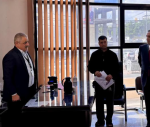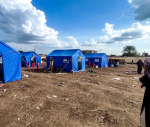You are here
Tehran, world powers ‘begin drafting nuclear deal’
By AFP - Jun 19,2014 - Last updated at Jun 19,2014
TEHRAN — Iran and world powers started drafting Wednesday a comprehensive nuclear agreement but still face many sticking points, Iranian Foreign Minister Mohammad Javad Zarif said.
“Today we have slowly begun to draft the final agreement... but there are still many differences” over the text, ISNA news agency quoted Zarif as saying from Vienna.
“This does not mean we have reached an agreement,” said Zarif, according to IRNA news agency.
“Fundamental disagreements” continue to divide Iran and the P5+1 powers — Britain, China, France, Russia and the United States plus Germany — he said.
But Zarif said the two sides have agreed on a title for the text, which will be known as the “General Joint Plan of Action”.
A new round of negotiations between Iranian diplomats and those of the six powers, which opened Monday in Vienna, had been “very difficult” so far.
The talks, which run through Friday, are aimed at clinching a comprehensive nuclear deal by a July 20 deadline set up by an interim agreement.
Iran’s top negotiator Abbas Araqchi earlier told IRNA news agency that Iran hoped to settle all differences with the six powers by the target date.
The main sticking points are the timetable for a full lifting of crippling US and EU sanctions, and the scale to which Iran would be allowed to continue uranium enrichment, he said.
Enrichment is the sensitive process at the centre of Western concerns about Iran’s nuclear ambitions, as it can produce both fuel for nuclear power stations and, in highly extended form, the core of an atomic bomb.
The P5+1 want Iran — which insists its nuclear drive is purely for civilian use — to drastically reduce its uranium production capacity, and keep only a few hundred centrifuges active.
They want to ensure that Iran’s nuclear activities are purely peaceful. In return, Iran wants the removal of international sanctions that have choked its economy.
US Treasury Secretary Jacob Lew said Wednesday Iran’s economy remained in a “state of distress” despite limited sanctions relief.
“Iran sanctions are the toughest the world community has imposed on any country, and its economy is suffering a serious blow as a result — an impact that is not being reversed,” Lew said at a meeting in Jerusalem of the Joint Economic Development Group.
‘Still a long way to go’
In the remarks to IRNA, Araqchi said “it won’t be a catastrophe” if the July 20 target date is not met.
“We hope to start work on Wednesday on drafting the text of a final agreement, not the big issues but the general framework and the introduction,” Araqchi said.
“There is a still a long way to go before we reach an agreement acceptable to all sides.”
An interim deal struck last November led the six powers to release $7 billion from frozen funds in return for a slowdown in Iran’s controversial uranium enrichment.
Iran began implementing the November deal in January.
Tehran said Wednesday that successful nuclear talks could lead to cooperation with the US over their shared interest in Iraq — where Sunni militants have seized large swathes of territory in a lightning offensive.
President Hassan Rouhani’s chief of staff Mohammad Nahavandian told reporters in Oslo that the nuclear talks were a “test for confidence building”.
“If that comes to a final resolution, then there might be opportunities for other issues to be discussed.”
Related Articles
Iran and world powers will hold technical talks “next week” in Vienna ahead of a political meeting to negotiate a comprehensive nuclear deal, a top Iranian negotiator said on Sunday.
Iran has received the first instalment of $4.2 billion in frozen assets as part of a nuclear deal with world powers, Deputy Foreign Minister Abbas Araqchi told ISNA news agency Saturday.
Iran will never slow down its nuclear research programme, its supreme leader said on Wednesday as negotiators from Tehran and six world powers struggled to narrow “significant gaps” that the United States warned might be insurmountable.
















